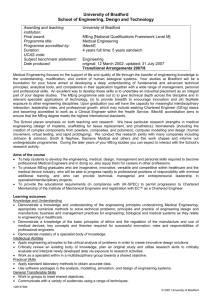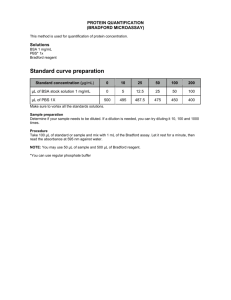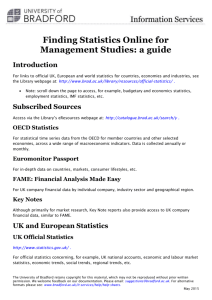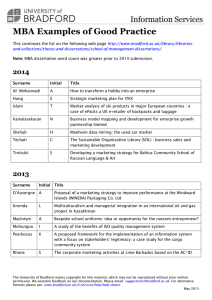at INTI - University of Bradford
advertisement
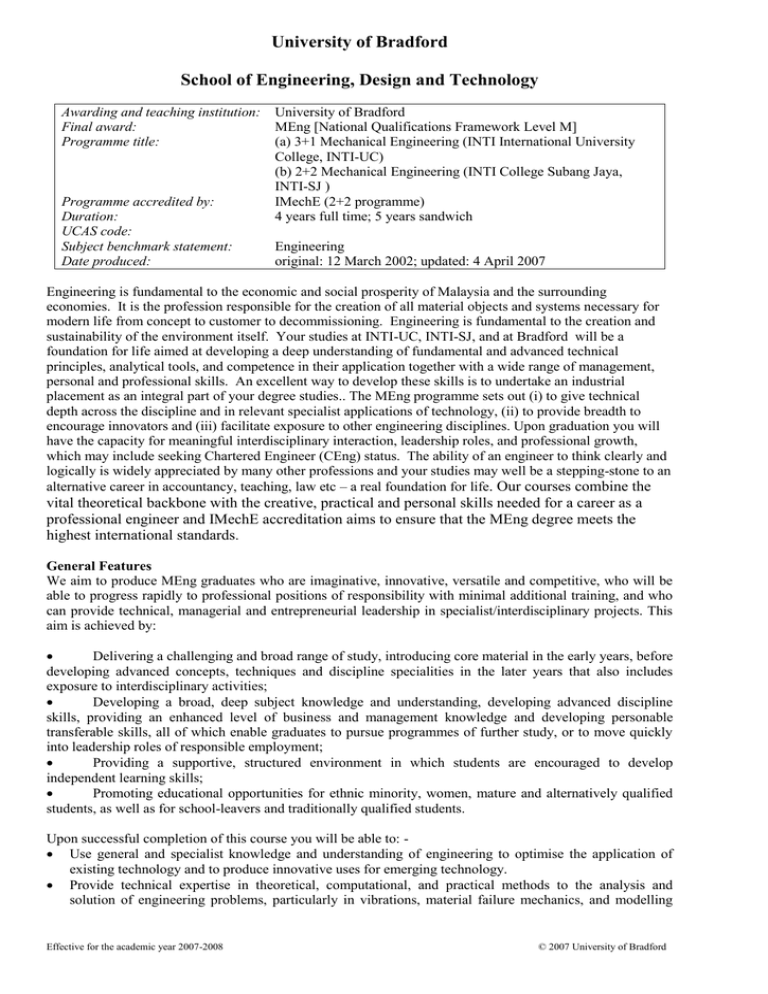
University of Bradford School of Engineering, Design and Technology Awarding and teaching institution: Final award: Programme title: Programme accredited by: Duration: UCAS code: Subject benchmark statement: Date produced: University of Bradford MEng [National Qualifications Framework Level M] (a) 3+1 Mechanical Engineering (INTI International University College, INTI-UC) (b) 2+2 Mechanical Engineering (INTI College Subang Jaya, INTI-SJ ) IMechE (2+2 programme) 4 years full time; 5 years sandwich Engineering original: 12 March 2002; updated: 4 April 2007 Engineering is fundamental to the economic and social prosperity of Malaysia and the surrounding economies. It is the profession responsible for the creation of all material objects and systems necessary for modern life from concept to customer to decommissioning. Engineering is fundamental to the creation and sustainability of the environment itself. Your studies at INTI-UC, INTI-SJ, and at Bradford will be a foundation for life aimed at developing a deep understanding of fundamental and advanced technical principles, analytical tools, and competence in their application together with a wide range of management, personal and professional skills. An excellent way to develop these skills is to undertake an industrial placement as an integral part of your degree studies.. The MEng programme sets out (i) to give technical depth across the discipline and in relevant specialist applications of technology, (ii) to provide breadth to encourage innovators and (iii) facilitate exposure to other engineering disciplines. Upon graduation you will have the capacity for meaningful interdisciplinary interaction, leadership roles, and professional growth, which may include seeking Chartered Engineer (CEng) status. The ability of an engineer to think clearly and logically is widely appreciated by many other professions and your studies may well be a stepping-stone to an alternative career in accountancy, teaching, law etc – a real foundation for life. Our courses combine the vital theoretical backbone with the creative, practical and personal skills needed for a career as a professional engineer and IMechE accreditation aims to ensure that the MEng degree meets the highest international standards. General Features We aim to produce MEng graduates who are imaginative, innovative, versatile and competitive, who will be able to progress rapidly to professional positions of responsibility with minimal additional training, and who can provide technical, managerial and entrepreneurial leadership in specialist/interdisciplinary projects. This aim is achieved by: Delivering a challenging and broad range of study, introducing core material in the early years, before developing advanced concepts, techniques and discipline specialities in the later years that also includes exposure to interdisciplinary activities; Developing a broad, deep subject knowledge and understanding, developing advanced discipline skills, providing an enhanced level of business and management knowledge and developing personable transferable skills, all of which enable graduates to pursue programmes of further study, or to move quickly into leadership roles of responsible employment; Providing a supportive, structured environment in which students are encouraged to develop independent learning skills; Promoting educational opportunities for ethnic minority, women, mature and alternatively qualified students, as well as for school-leavers and traditionally qualified students. Upon successful completion of this course you will be able to: Use general and specialist knowledge and understanding of engineering to optimise the application of existing technology and to produce innovative uses for emerging technology. Provide technical expertise in theoretical, computational, and practical methods to the analysis and solution of engineering problems, particularly in vibrations, material failure mechanics, and modelling Effective for the academic year 2007-2008 © 2007 University of Bradford and simulation, for Mechanical Engineering; vehicle dynamics, engines and electronic control, and virtual vehicle prototyping, for Mechanical and Automotive Engineering. Demonstrate leadership in meeting the technical and managerial requirements for effective project implementation. Learning outcomes indicate what you should know and understand, and be able to do on successful completion of the course. Engineering is an interactive process usually involving creation, planning, analysis, design, economic evaluation, manufacture, operation & maintenance and decommissioning with a view to minimising environmental impact. On successful completion of this course, you will develop the following: Knowledge and Understanding of o The fundamental concepts, principles and theories underpinning Mechanical and Automotive Engineering with core knowledge in: mechanics of materials, solids and dynamics (Mechanical Engineering) or vehicle engines, electronics and dynamics (Mechanical and Automotive Engineering) o The principles and practice of engineering design and manufacture o Business and management practices that are relevant to engineering and engineers o Detailed knowledge and systematic understanding of key concepts, principles and theories required for successful innovation o o o Demonstrate a knowledge of the basic principles of organisation, project management, health and safety within the Mechanical & Automotive industry. Demonstrate an appreciation of models of leadership and personal development as applied to the strategic development and promotion of change within the profession. Demonstrate an understanding of approaches to optimising the solution of multi-disciplinary problems. Intellectual Skills o o o o o o o Apply engineering principles and inter-personal skills to the critical analysis of multi-disciplinary problems in order to create innovative solutions to non-routine problems. Identify an area for further detailed investigation, design and experimental programme, utilise research skills to critically evaluate and interpret newly developed data Integrate engineering understanding and apply insight to the solution of real problems. Plan, conduct and report a programme of original research; Design a system component or process to meet a need Integrate and evaluate information from a variety of sources Take holistic approach in solving problems and designing systems, applying professional judgements to balance risks, cost, benefits, safety, reliability and environmental impact. Practical Skills o Use Industrial Standards Computational tools and packages in the advanced analysis, design and evaluation of complex engineering systems. o Use numerical methods for modelling and analysing engineering problems relevant to your chosen specialism; Selection and application of principles and data collection & manipulation methods to support problem solving; Skills of analysis, synthesis & evaluation to support design; Plan, undertake and report an investigation. o o o o o o Apply standard laboratory methods to obtain accurate data An ability to balance sometimes conflicting, ambiguous and/or incomplete aspects encountered in creative problem solving and design; Specify, plan, undertake and report an investigation and associated methodologies via exposure to research activities. Personal and Transferable Skills o Work in groups in order to meet shared objectives o o Use problem solving strategies to develop, monitor and update a plan for the solution of both technical and personnel contributions to meeting organisational need. Lead small teams and apply new theories and concepts to their personal development. o Use problem solving strategies to develop innovative solutions Effective for the academic year 2007-2008 © 2007 University of Bradford o o Learn independently in familiar and unfamiliar situations with open mindedness and in the spirit of critical enquiry Learn effectively for the purpose of continuing professional development and in a wider context throughout their career The curriculum The map of the curriculum that you will study is detailed at the end of this document showing core (C) and optional (O) modules. All modules are core in the first years of your studies at INTI-UC and INTI-SJ. Options are introduced during the final period of study at Bradford. If you are on the 2+2 programme, we strongly encourage you to undertake a period of industrial placement between stages 3 and 4. The University monitors the work undertaken during the placement and counts towards the industrial training requirements of the IMechE. You will receive a Diploma of Industrial Studies for successful completion of your 12 month placement. At INTI-UC and INTI-SJ, each year, or stage, of an MEng course comprises two long terms of 15-week duration with 50 credits being studied in each term and a short term of seven weeks duration in which 20 credits are studied. For 10 credit modules all of the teaching and assessment is undertaken in the same term. Some of the 20 credit modules have teaching and assessment that occurs in both of the semesters. At Bradford, each year, or stage, of an MEng course comprises two semesters of 15-week duration with 60 credits being studied in each semester. For 10 credit modules all of the teaching and assessment is undertaken in the same semester. Some of the 20 credit modules have teaching and assessment that occurs in both semesters. Assessment regulations: a summary (the text of the progression regulations is maintained on the Web) To pass and proceed from each stage to the next, and also to be eligible for an MEng award, you must achieve (at first attempt) either at least 55% in 100 credits and at least 40% in the other 20 credits; or or an overall average of at least 60% together with at least in 100 credits and 35% in the other 20 credits. The award of the MEng degree is based upon the final year marks. An MEng award is unclassified although an overall average of at least 70% may allow an award with Distinction. MEng students who fail to attain this level in Stage 1 of the course are permitted supplementary assessments in all failed modules. However, this right only applies in Stage 1 and the appropriate Credit rating must be attained at first attempt in Stages 2, 3 and 4. MEng students who obtain less than 55% in any module (in Stage 1 only) will be offered the opportunity to undertake supplementary assessment in the subsequent semester in which the module is taught. Should you fail the supplementary assessment in any module you will be required to suspend your registration until such time as you have gained satisfactory marks. Upon completion of Stage 1 study a decision will be made whether to confirm MEng progression, transfer your registration to that of BEng (Hons) - provided you attain 100 Credits at 40% and 20 Credits at 35% - or require you to withdraw. BEng (Hons) students are entitled to supplementary assessments in Stage 2 and 3 modules under University regulations. In the event that you do not progress from stage 3 to stage 4 on the MEng course you may be eligible for an accredited BEng (Hons). Similarly, should you be progressing to Stage 3 study with a BEng registration you may be eligible for an accredited BEng (Hons). The class and division of the Honours degree that you may be awarded is based on the overall weighted marks that you receive for each stage; Stage 2 contributes 30% and Stage 3, 70%. The classes and divisions of the Honours degree are awarded on the basis of the following final overall weighted average marks: 70.0% or above: 60.0% or above: 50.0% or above: otherwise: Effective for the academic year 2007-2008 First Class Honours Second Class Honours – First Division Second Class Honours – Second Division Third Class Honours © 2007 University of Bradford If you complete Stage 1 successfully, you are eligible for a Certificate of Higher Education; if you complete Stage 2 successfully, you are eligible for a Diploma of Higher Education. The learning outcomes for these awards and the final award are consistent with those of the national qualifications framework for England. Teaching, learning and assessment strategies The teaching and learning strategy takes into consideration the learning outcomes, progression through the levels of study, the nature of the subject and the student intake, and the need for you to take greater responsibility for your own learning as you progress through the course. The strategies and methods implemented are: The teaching and learning methods implemented to engage you in developing your knowledge and understanding of the course include formal lectures (including those from Visiting Lecturers), case studies, tutorial exercises, practical demonstrations, directed learning and individual work. The method of assessment is by written examination and both analytical and experimental coursework. The methods implemented in developing your intellectual skills include engaging with you during tutorial exercises, case studies, practical demonstration and supervised research or project work. You will develop skills of working with other engineering disciplines particularly in the Interdisciplinary Competitive Design module. In Stage 4 you will also learn the skills associated with designing and executing your own research project. The methods of assessment of intellectual skills are implicit in the written examinations, analytical and experimental coursework and more particularly in your Final Year Project work. The methods implemented in developing your practical skills include demonstrations and practicals linked with the taught modules. You will also design and operate equipment and/or procedures and use control and measuring instruments under supervision during your project work. The methods of assessment of practical skills include feedback on laboratory work linked with the taught modules. Also a large part of the mark of the Project report will be attributed to the Experimental Method and Equipment and the Presentation & Discussion of Results. The methods implemented in developing the students’ transferable skills are implicit in the programme. The University of Bradford is well known for attracting students from a wide variety of background, experiences and countries. This and the learning facilities available to all students provide the conditions for students to develop and manage their learning. The University of Bradford modus operandi, Making Knowledge Work, is imbedded in the philosophy of this course (and will be reflected at INTI-UC and INTI-SJ), particularly in the area of Engineering, Design and Technology, which is well equipped with practical and computational facilities. In particular, you will learn skills of mentoring colleagues in the Coaching Development module in which you will work with Stage 1 students to support their introduction to their course of study. The methods of assessment of transferable skills are built in the structure of the examinations, case studies, laboratory demonstrations and research or project work. Admissions policy The entry requirement is the equivalent of 300 UCAS points, in addition to English Language requirements of IELTS average Band 6.0 or equivalent. This must include an advanced qualification in mathematics, such as A Level or equivalent study on a Diploma course. Students seeking direct entry to Stage 2 or Stage 3 of the MEng course should present a Grade B+ from the Diploma or UK Advance Standing qualifications respectively. Nevertheless, offers are only made after detailed consideration of each individual application and the precise requirements we ask of candidates will vary. Most important in this decision is our assessment of a candidate’s potential to benefit from their studies and of their ability to succeed on this particular course. We also pay considerable attention to an applicant’s academic background and achievements and to all other nonstandard qualifications or who, lacking academic qualifications, have significant relevant experience. Student support and guidance Effective for the academic year 2007-2008 © 2007 University of Bradford This is well provided both at INTI-UC and INTI-SJ and the University. All members of academic and support staff at INTI-UC, INTI-SJ and the University are equally approachable so you will always be able to find a “friendly face” with whom you feel comfortable. All you need to do is ask and we are ever willing to help. Your time studying for your degree, be it in Malaysia or the UK, will result in personal and professional associations that will sustain you throughout your career. INTI-UC and INTI-SJ provide important, state-of-the-art facilities including extended access to Library and Computing services. The Career and Counselling Centre provides free counselling and related services, such as the Mentor Mentee Programme, study skills and career seminars. The Student Affairs Office provides welfare services and support to the disabled. At Bradford, the School has a system of handbooks, year tutors and formal staff-student liaison committees so that issues are rapidly dealt with. As with INTI-UC and INTI-SJ, the University provides important facilities such as extended access to Library and Computing services, counselling and welfare services, careers advice and a Disabilities Office. The latter routinely arranges dyslexia assessments and appropriate additional time allocation for sitting examinations. The School operates an innovative 3-tier women’s mentoring scheme. Female engineering graduates mentor current undergraduates who in turn act as role models for female school students. The contents of this Programme Specification may change, subject to the University's course and regulatory approval, monitoring and review procedures. MEng Mechanical Engineering Unit Code Credit Stage Sem ENG1063L ENG1056M ENG1003M ENG1033M ENG1039M ENG1052M 10 10 10 10 10 10 1 1 1 1 1 1 1 1 1 1 1 1 1 1 1 1 1 1 Engineering Mathematics Engineering Computation Materials Technology Introductory Mechatronics Vehicle Engineering 1 Introductory Solid Modelling C C C C C C ENG1063L ENG1015M ENG1032M ENG1004M ENG1002M ENG1016M 10 10 10 10 10 10 1 1 1 1 1 1 2 2 2 2 2 2 1 1 1 1 1 1 Engineering Mathematics Structural Mechanics Fluid Mechanics 1 Manufacturing Systems Mechanics of Machines Stage 1 Project C C C C C C ENG2027M CY-0205M ENG2026M ENG2034M ENG2015M ENG2038M 10 10 10 10 10 10 2 2 2 2 2 2 1 1 1 1 1 1 2 2 2 2 2 2 Further Engineering Mathematics Sensors & Actuators Structural & Solid Mechanics Thermodynamics Design for Manufacture & Assembly Fluid Mechanics 2 C C C C C C ENG2028M 10 2 2 2 ENG2030M ENG2005M ENG2013M ENG2023M ENG2002M 10 10 10 10 10 2 2 2 2 2 2 2 2 2 2 2 2 2 2 2 Computer Modelling Techniques Engineering Statistics Vehicle Engineering 2 Financial Management Engineering Materials Machines Dynamic Design C C C C C C ENG3042J ENG3008D ENG3076M 10,20 10 10 3 3 3 1, 2 1 1 3 3 3 ENG3069M ENG3013M ENG3037M ENG3048M 10 10 10 10 3 3 3 3 1 1 1 1 3 3 3 3 Project Advanced Design Applications Materials Failure Mechanics Car Safety and Legislation Manufacturing, Planning & Control Engine & Powertrain Six Sigma for Business Excellence C C C O O O C Effective for the academic year 2007-2008 Level Module Title Mech © 2007 University of Bradford ENG4064M ENG3004M 10 10 3 3 2 2 M 3 3 3 3 3 3 3 Energy Studies Vehicle Dynamics Reliability Engineering Product Design & Innovation Corporate Strategy & Engineering Management Vehicle Control Systems Real Time Computing & Instrumentation Civil Aerospace: Technology & Business C O O C C O O O ENG3049M ENG3014M ENG3011M ENG3021M ENG3018M ENG3032M 10 10 10 10 10 10 3 3 3 3 3 3 2 2 2 2 2 2 ENG4078M 10 4 1 M Coaching Development C ENG4050L ENG4047L ENG4049L ENG4051L ENG4029M ENG4037M 10,10 10,10 10,10 10,10 10 10 4 4 4 4 4 4 1,2 1,2 1,2 1,2 1 1 M M M Interdisciplinary Competitive Design Virtual Vehicle Prototyping Control Systems Design Mobile Robotics & Wireless Sensors Design Optimisation Computer Application of Numerical Methods C O C O C O ENG4081M 10 4 1 M Mechanical Vibrations C ENG4072M 10 4 2 M Risk Management C ENG3079M 10 4 2 M Environmental Computational Fluid Dynamics O ENG4025M ENG3082M 10 10 4 4 2 2 M M Finite Element Methods Manufacturing Systems Simulation O O ENG4060M ENG4064M ENG4073M ENG4059M 10 10 10 10 4 4 4 4 2 2 2 2 M M M M Transport Process Modelling Energy Studies Advanced Solid Mechanics Materials Processing O C O 20 10 20 20 M M M Credit rating of options to be selected Stage 3 Semester 1 Stage 3 Semester 2 Stage 4 Semester 1 Stage 4 Semester 2 Restrictions : Optional modules selected in Stage 3 cannot be selected again in Stage 4 Effective for the academic year 2007-2008 © 2007 University of Bradford Contact Details INTI International University College (INTI-UC) Dr. Nirwan Idrus, Dean of Faculty of Engineering and Technology INTI International University College (INTI-UC): Jalan BBN 12/1, Bandar Baru Niali 71800 Nilai, Negeri Sembilan, Malaysia Tel: +60 6 798 2000 Fax: +60 6 799 7531 nirwan_idrus@intimal.edu.my Programme Officer: Ms Patricia D/O Rayappan patricia@intimal.edu.my University of Bradford School of Engineering, Design and Technology University of Bradford Richmond Road Bradford BD7 1DP ug-eng-enquiries@bradford.ac.uk Tel: +44 (0)1274 234567 Effective for the academic year 2007-2008 © 2007 University of Bradford

